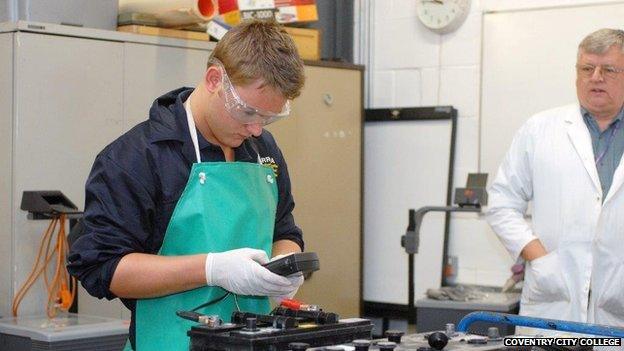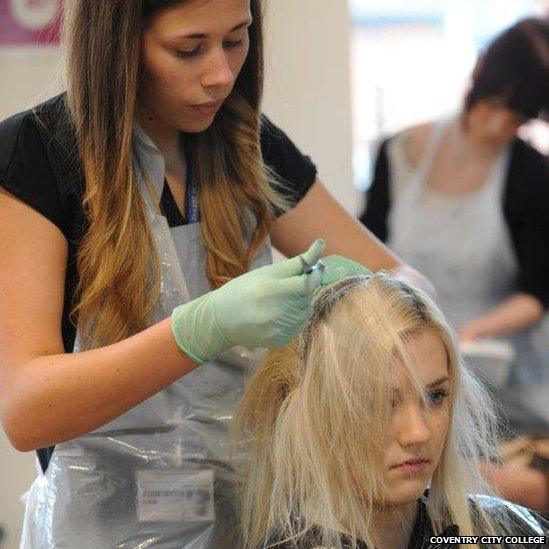Can teenagers with poor GCSEs catch up at college?
- Published

College staff have themselves had to learn new skills in order to support students
As thousands of 16-year-olds in England sit GCSEs in maths and English, BBC education correspondent Gillian Hargreaves goes to meet teenagers trying to achieve good grades second time around.
At Coventry City College, staff more used to teaching hairdressing or construction have been set the challenge of teaching English and maths GCSEs to students who did not achieve the benchmark C grades at school.
Achieving C grades in these subjects is crucial for anyone wanting to progress to most vocational courses or apprenticeships leading to a good career.
But every year about 40% of candidates fail to meet this standard.
Key skills
Since September 2013, the government has insisted further-education students who did not succeed at 16, study GCSEs in these key skills until they are 18.
The hope is that they will eventually pass - and their college funding is conditional on them continuing to try.
Reece Beal, by his own admission, switched off during English and maths lessons at school - but now, as part of apprenticeship in coach-making for Arriva, he is flourishing.
"At school I didn't achieve the proper level, I couldn't grasp what we were doing, and it wasn't quite explained enough basically," he says.
"Here its more one-on-one, so if you are struggling on one area, they focus on that area so you can get better at it."
Reece is doing well, perhaps motivated by the knowledge that it will be impossible for him to progress to higher level training or apprenticeships without good grades in these two subjects.
For Richard Brooks, a former adviser to the Department for Education and Ofsted, good GCSEs in English and maths amount to vocational qualifications.
"If you look at the number of people who are unemployed, or not in any from of training or education, at the age of 19, the most common characteristic of them is they lack that all important GCSE English and maths at C grade," he says.
"We have an image of these people being difficult, socially excluded, the Neet [not in education, employment or training] generation.
"Actually, most of them are perfectly average. The thing they have in common is that lack of GCSE English and maths."
Trainee hairdresser Samantha Richards recently achieved the equivalent of C grades in English and maths through an alternative qualification called Functional Skills., external
She says she would not be able to cope in her chosen profession without being able to write emails, do stock checking or work out ratios when measuring hair dye.
There is also the added bonus of being able to help with her own children's homework in a way she would never have dared before .
She says: "My children come to me and ask me for help now. Before I'd shy away from it and say, 'You can do this yourself.'
"Now, it's like, 'Yes, course I can. Let's sit down and work it out.'"

Good English and maths are crucial to succeeding as a hairdresser
Colleges are having to try to achieve in two years what schools failed to deliver in a decade of formal education.
Coventry City College is getting record numbers of candidates through their GCSEs by radically changing its approach.
Two new highly qualified maths graduates have been employed to enthuse both students and lecturers alike, while older teachers such as Andrea Radford, who has taught hairdressing at the college for decades, have had to go back to school themselves.
"I think it does help because I've now got an understanding of what they are going through," she says.
Progress
In the car workshop, Jason Riley, a former road digger training for work in Coventry's automotive industry, says this approach is paying off for him.
His tutor, Di Crooks, is a former police officer.
"I did go to another college, but they weren't as persistent at teaching the key skills," he says.
"It wasn't until I got here, sat down with Di, who said, 'You've got to learn this, this and this.'
"Then, I thought, 'I've got to pull my socks up here.'
"Di helps me with my maths and English as well as the rest of my coursework."
As Di Crooks says, students "need to realise apprentices with these good skills, English and maths, are the ones who are going to progress higher in a job".